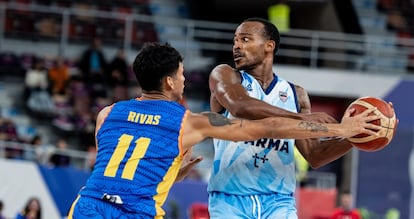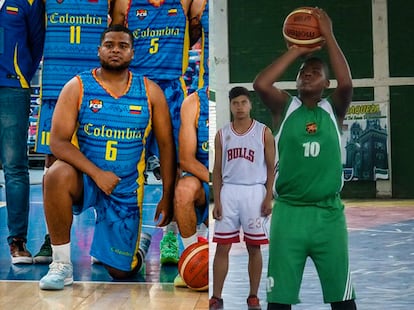Something was wrong from the first game. It was the start of an international basketball tournament, in a country that was banned from participating in international tournaments after its invasion of Ukraine: Russia. At the end of August, the Russian Basketball Federation organized in Perm, a city 18 hours from Moscow, what they called the Friendship Cup. A few international friends confirmed their attendance, Venezuela and Colombia. But something strange was happening with the Colombians. On August 21, in the first game, that delegation lost resoundingly, as if they had never played, against the Perm team: 155 to 53. “In my career I have never won a game with a 100-point difference,” said Samson Ruzhentsev, one of the local players. The Colombians are not so bad at basketball, but this team was terrible: it suffered losses in the next two games, 108 to 53 against Venezuela, and 99 to 63 against a youth team from Perm. On August 23, an explanation was published in the Russian media: this was not the official Colombian team. Those who played so poorly, although they were Colombian, were amateurs, men who had only played in youth tournaments at their schools and universities, and who had deceived the Russian federation.
“At first, to be honest, when we received information on social media that there were some Colombians playing in Russia, we thought they were trying to get us sucking cock“We don’t know who the fake players were,” says the president of the Colombian Basketball Federation, John Mario Tejada. When they realized it wasn’t a bad joke, the Federation published a statement saying that they never received a formal invitation from Russia to play in that tournament, nor did they give the players the endorsement to represent the country. “We don’t know those who took part, none of them have participated in the professional league,” adds Tejada. They have not contacted the fake players. This newspaper tried to contact several of them, but did not get a response: they have been silent since the farce was discovered.
The Colombian Federation has filed a criminal complaint for impersonation, and has reported the events to FIBA, the International Basketball Federation. They have not spoken to the Russians directly, and that Federation has its own version of events. Its president, Andrei Kirilenko, has said that they did make a formal invitation and received an official response from the Colombian federation. “We will get to the bottom of how this happened,” he said. Kirilenko to the Russian media. For now, it has been speculated that the players hacked the Colombian federation’s website or email to send that official response.

Tejada, however, does not believe in the hacking theory. “If an audit has to be done, then it will be done. But, to be honest, we have not lost control of our email, our page works well, and the tournament invitation never arrived in our email,” Tejada insists. “I would dare to say that they, those players, are impersonating us by inventing an email address,” he adds.
Newsletter
Analysis of current events and the best stories from Colombia, every week in your inbox
RECEIVE IT
This assumption is also made by the Russian media, after seeing the supposed official letter received by the Russian Federation. In this letter, which confirms that a delegation of 20 Colombian members will go to Russia, including several for whom the Russian government would pay for tickets and accommodation in a four- or five-star hotel, there is a suspicious contact email: lalasilveria23@gmail.com. As the Russian media found, this email is the same one used to make purchases in a supermarket by a young Colombian, 25 years old, who studies civil engineering in the city of Kazan.
Christian David Mosquera Durán, the supermarket shopper, is a university student at the center of this plot, both because of his email and because of his residence in Russia. Born in Bogotá, he is a young Afro-Colombian who has played in small basketball tournaments at his Russian university, and who as a teenager participated in intercollegiate tournaments as part of the team of the Salesian school Centro Don Bosco. At least two of his friends from that team, Ángel Herrera and Miguel Torres, were part of the fake Colombia team in Russia. They won a college championship in 2014, which remains reason for pride in Torres’ Facebook page.

Cup. (Right) Christian David plays basketball in a photo on his social media.RUSSIAN BASKETBALL FEDERATION/10christiandavid
EL PAÍS contacted Mosquera and some of his acquaintances for this article, but did not receive a response. The social media accounts show photos of young people passionate about basketball, friends for years united by their love of the sport. They have not explained their motivations to the press, they have not said whether it was money, fun or something else that motivated them to pass themselves off as part of an official team. A member of the Federation, who prefers not to give his name, speculates about the impostors: “They went to Russia to look for opportunities, and one understands, in part, that they wanted to show off, compete, play.” They tricked the Russian federation into wearing a Colombian uniform at least once in their lives — a uniform that, by the way, is not the official one of the Colombian Basketball Federation.
Tejada, in any case, regrets that the fake team is getting so much attention. “It is a shame that the news about basketball in Colombia is given by the pranks of some young people, when we are on an upward trajectory in the sport, when we have beaten Argentina, Brazil, Mexico, Uruguay, all the powers of South America, when we have players in the best teams in the world. All of that is overshadowed by what I think is a joke.” The Colombian women’s team, for example, has already won two games against Venezuela and Paraguay in the current South American basketball tournament in Chile. They have not yet received the same attention that the fake team got in Russia.
Subscribe here to the EL PAÍS newsletter on Colombia and Here on the WhatsApp channeland receive all the key information on current events in the country.
#team #cronies #replaced #Colombia #basketball #tournament #Russia

